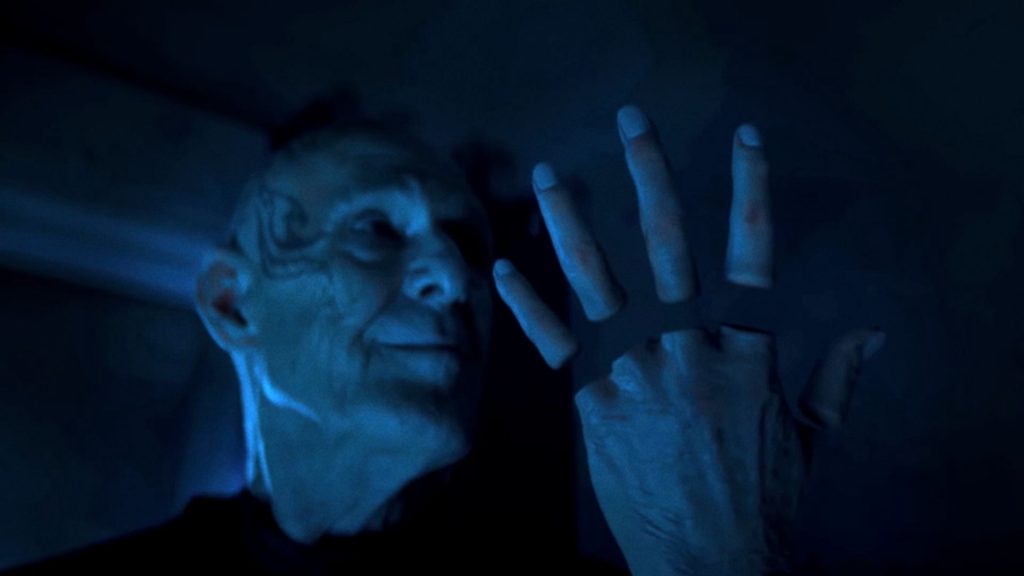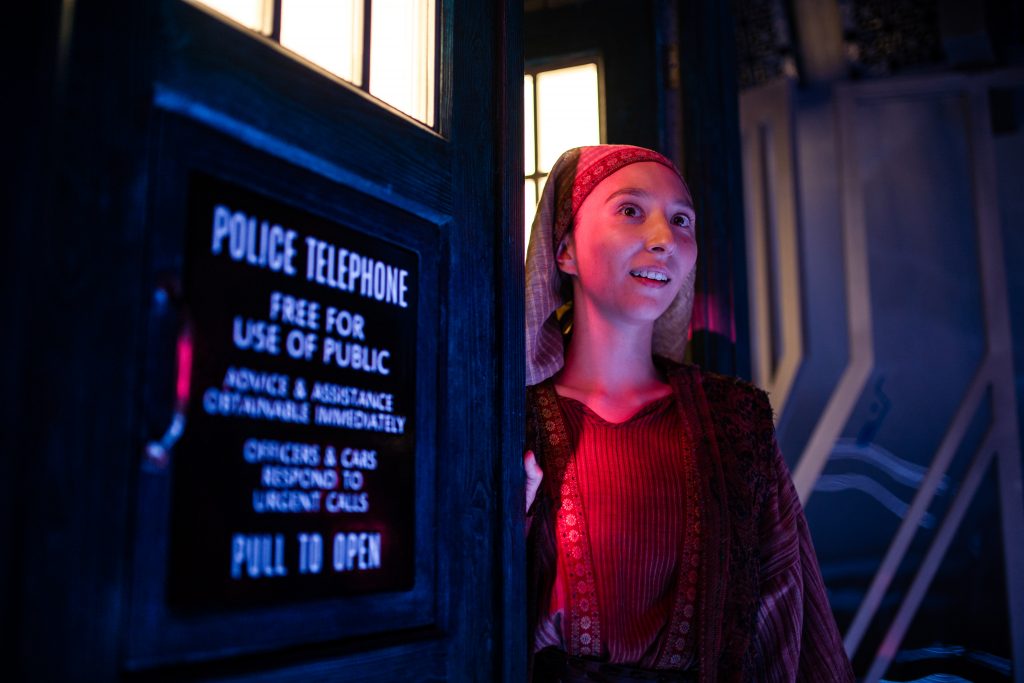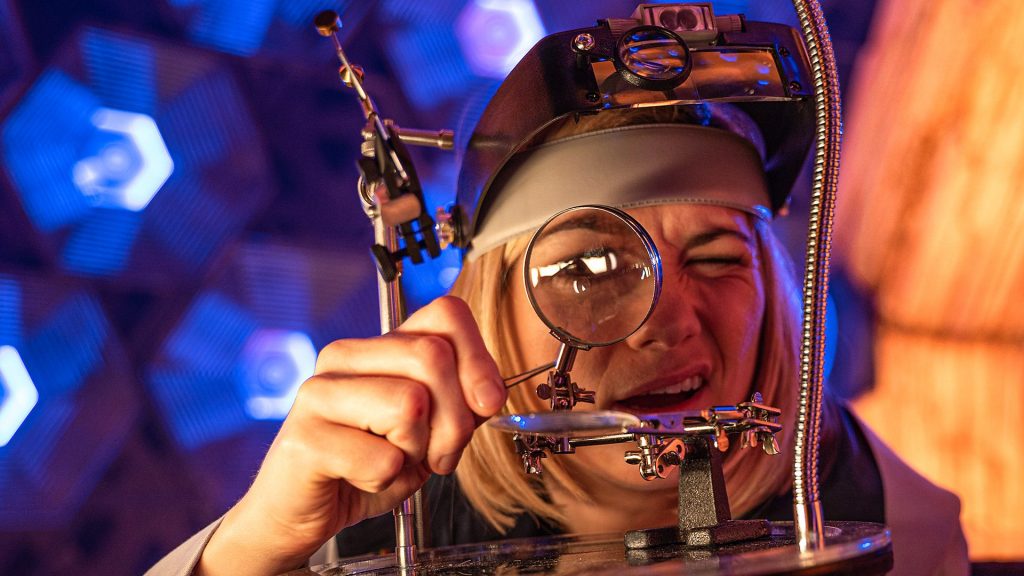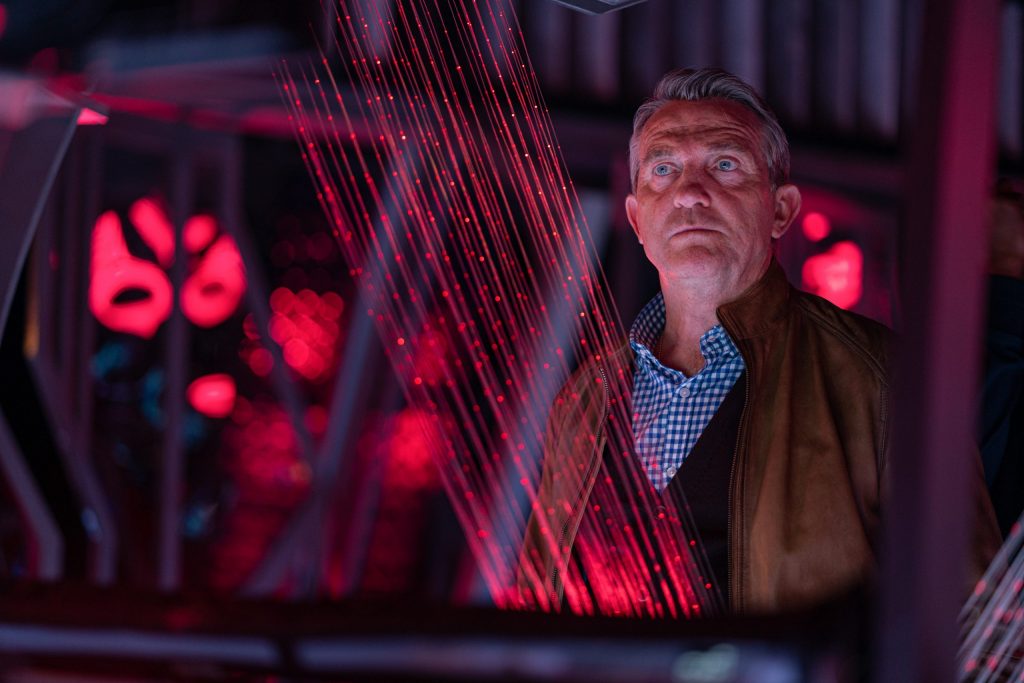
Image: BBC
Review by Paul Mount
Written by Charlene James & Chris Chibnall
Directed by Emma Sullivan
From ancient Syria to present day Sheffield, and out into the wilds of space, something is stalking the Doctor and her friends. As Graham, Yaz and Ryan return home to see friends and family, they find themselves haunted by very different experiences. Who is the figure calling from beyond the stars for help, and why? And what are the fearsome Chagaskas terrorising Aleppo in 1380? To find the answers, Team TARDIS embark on a mission that forces them to face their darkest fears…
“Now on BBC One it’s time for Doctor Who – this week’s issue is mental health awareness…”
The line between Doctor Who’s place as an exciting, fast-paced, family-friendly sci-fi adventure and its new self-appointed remit to educate its audience on the state of the world and its current woes and our own human failings becomes increasingly blurred in Can You Hear Me?, the debut script from Charlene James (albeit it with the now-obligatory co-writer credit for showrunner Chris Chibnall) which deals, largely obliquely and not entirely successfully, with issues surrounding mental health.
As usual in this thumpingly unsubtle new finger-wagging era of Doctor Who, it addresses its theme with a degree of unfortunate clumsiness and a frustrating lack of clarity – and yet it somehow manages to deliver an intermittently-interesting and well-written episode that again demonstrates Doctor Who’s willingness to at least attempt to break new ground by addressing societal taboos more usually dealt with (often equally clumsily, it must be said) by our raft of soap operas.
The jury remains out as to whether this approach really suits an escapist adventure series (the still-tumbling ratings seem to suggest it doesn’t) but Chibnall and his team are to be commended for at least trying to make the show relevant and meaningful and about something now and again, even as its more fervent fans continue to rail against it being anything other than the simplistic space adventure romp they watched when they were five. But sometimes it’s hard not to yearn for the days when Doctor Who dealt with “issues” in a slightly more allegorical fashion rather than, as seems to be the case these days, by requiring the lead actor to directly address the camera and tell us off for mistreating the planet or ourselves or, as with Can You Hear Me?, by flashing up details of a telephone helpline for viewers affected by issues raised by the episode.
The Doctor deposits her “fam” (yikes!) back in Sheffield for some r’n’r and a chance to catch up with family and friends. She then receives a call from ancient Syria and dashes off on her own to investigate. Meanwhile, Yaz, Graham and Ryan all suffer strange dreams featuring a mysterious, bald, cloaked figure with detachable fingers (no, seriously…) and Graham has a vision of a young woman trapped between two worlds.

Aruhan Galieva as Tahira in Can You Here Me. Image: James Pardon/BBC Studios/BBC America
In Syria in the 14th century, the Doctor has found Tahira (Aruhan Galieva), the only survivor of an ‘attack’ on the mental institution where she has sought sanctuary by hideous werewolf-like creatures and when her companions contact her – conveniently, all at the same time – to tell her about her nightmares, she takes Tahira in the TARDIS (it has a very ‘open door’ policy this season). Soon, all six are travelling to a vessel in deep space in geostationary orbit around two planets at the edge of collision.
Here the Doctor eventually meets up with the dream-invader himself. This is Zellin (Ian Gelder), an immortal creature, perhaps one of the race of Eternals introduced in the Fifth Doctor story Enlightenment, a story first broadcast in 1983 when Peter Davison played the series lead role. The Eternals amuse themselves for infinity by toying with other creatures and influencing their lives and their actions. But interference in the life cycles of two particular unnamed planets caused Zellin’s similarly immortal partner Rakaya (Claire-Hope Ashitey) to be captured and placed in a small prison structure which stops the two planets actually colliding. Zellin has been transmitting human nightmares to Rakaya to keep her amused and sane whilst imprisoned and now plans to free her so the two can feed on the fears and insecurities of the human race on Earth…
There’s a lot of plot crammed into Can You Hear Me? and this is, partly, one of the reasons why it’s something of a curate’s egg. In Zellin we have a full-on, creepy-looking bad guy who does some extraordinary things – the scenes where his fingers detach and insert themselves into the ears of his victims are either terrifying or ridiculous, your mileage may vary – and the story plays with some big, brash science-fiction/fantasy concepts and delivers a few ‘old series’ continuity references designed to make the fanboys quiver.

Image: BBC
But the real crux of the story, pretty much its raison d’etre, too often lost in a blur of running about and the usual desperately-garbled heavy-handed exposition from Jodie Whittaker’s Doctor (and an effective if slightly awkward animated sequence crowbarred into the narrative to explain the history of the planets abused by the Eternals), is to highlight issues surrounding mental health. Several characters throughout the episode are blighted by potentially-debilitating personal crises; least effective, perhaps, is Tahira whose fears and insecurities have caused her to manifest dodgy CGI monsters in the 14th century.
Much better, though, are those scenes involving Ryan’s childhood friend Tibo (Buom Tihngang) who has clearly lost his self-confidence and his self-esteem and at the end of the episode (after finally becoming involved in Ryan’s strange new world) we see him attending a self-help group which at least gives him a chance to talk to other people and express his feelings, however falteringly.
This is a true and raw realisation of the reality of mental health problems for many people; they just don’t feel right and they really don’t know why. Hopefully, the episode is suggesting that Tibo has taken the first step on the path to recovery – just talking about what’s going on in his mind rather than keeping it to himself – rather than the ‘cure’.
Tihngang’s performance is unfussy and affecting and it works because it’s largely grounded and real and uncomfortably everyday despite the madness that spirals around him as he finally becomes embroiled in the world of the Doctor and her friends.
The Doctor’s trio of travelling companions have their own issues, too, and here at last we have an episode that tries to get to grips with them as people rather than cyphers standing around in the background gawping and asking the Doctor what’s going on. Ryan realises that constantly leaving the real world behind could have troubling consequences in the future when he finally decides to return to his normal life. Are we being signposted that his time aboard the TARDIS coming to an end?

Image: BBC
Graham, meanwhile, is worried that his cancer might return; it’s a very real fear for anyone who has suffered from this terrible disease and, frankly, the scene at the end of the episode where he seeks some sort of reassurance from the Doctor who just shuffles away playing distractedly with the TARDIS controls and garbling about social awkwardness and not knowing what to say is horribly misjudged, a weak moment of misguided and unnecessary comedy which pretty much utterly subverts the whole character of the Doctor and makes her come across like a callous, uncaring time-travelling idiot.
Yes, we know the Doctor is an alien who tends to brush aside the niceties out of necessity, but the script here horribly fudges a scene that could have forged a really strong and tender relationship between the Doctor and a character who has been little more than comic relief until now.
Mercifully, the story thread dealing with Yaz is better handled as we flash back three years to a crisis from her youth which, frustratingly, the script never really elaborates on; she seems to be leaving home because she’s unable to cope with bullying at school but is she, as seems to be suggested, a suicide risk? The scenes in which she is “rescued” by a sympathetic Police officer (Nasreen Hussain) out on the moors are nicely played and with an emotionally-resonant pay-off (quite literally) but there’s something missing, the script not quite prepared to fully nail its colours to the mast where it could, perhaps, have really made a much stronger point about the randomness of mental health problems and how anyone, young and old, can suffer in silence.
Ultimately, only someone caught in the maelstrom of mental health illness can really judge how well the episode achieved whatever it set out to do but from the perspective of an outsider it seems that it managed only to emphasise that perhaps we all need to be aware of the fragility of those around us and that those dealing with mental health problems often do so alone without reaching out and seeking help or even just privately expressing what they’re dealing with. Maybe, in the end, that’s the only real message of any worth an episode of a science-fiction adventure series, however well-meant, can ever really hope to put across when it ventures into something so very real-world and so intangible.
It’s hard to work up a lot of enthusiasm for Can You Hear Me? (and to resist shouting “Yes, I can hear you Clem Fandango…” at the screen) because, at its heart, it’s little more than an efficient, workmanlike Doctor Who yarn peppered with a few “old series” references for the fans and a couple of scenes likely to freak out any tiny children still watching and underpinned by its determination to try to address an issue that’s really far too complex for a show like Doctor Who to adequately get to grips with.
The ongoing “Timeless Child” story arc is briefly referenced but the Doctor seems to have casually forgotten that, just recently, she met a version of herself that she can’t reconcile with anything she understands about her very existence; it might be nice if these in-between routine adventures at least acknowledged that this is troubling her, even a little bit rather than just sending her off to quip her way through another breathless fifty-minute romp.
Full marks for trying, but Doctor Who is now drifting a bit too far from its preferred and populist remit and, far from winning over a new audience, it’s increasingly alienating not only its die-hards but also the casual audience who just want to enjoy a full-bodied imaginative adventure without feeling, justifiably, that they’re being hectored and lectured at.
Next week, we’re off to the Villa Diodati near Lake Geneva in the summer of 1816 for, hopefully, something a little less wilfully instructive as the Doctor and her chums prepare for an encounter with Mary Shelley, Lord Byron and Percy Bysshe Shelley at the birth of one of fiction’s most famous monsters…
Paul Mount
• Pre-Order Doctor Who Series 12 on Blu-Ray | DVD
WEB LINKS
• Doctor Who – Can You Hear Me? BBC
• Radio Times – Doctor Who: Who are the Eternals, the Guardians and the Toymaker?
Doctor Who © BBC Studios
Dear Readers: A review is an opinion. Other opinions are available
The founder of downthetubes, which he established in 1998. John works as a comics and magazine editor, writer, and on promotional work for the Lakes International Comic Art Festival. He is currently editor of Star Trek Explorer, published by Titan – his third tour of duty on the title originally titled Star Trek Magazine.
Working in British comics publishing since the 1980s, his credits include editor of titles such as Doctor Who Magazine, Babylon 5 Magazine, and more. He also edited the comics anthology STRIP Magazine and edited several audio comics for ROK Comics. He has also edited several comic collections, including volumes of “Charley’s War” and “Dan Dare”.
He’s the writer of “Pilgrim: Secrets and Lies” for B7 Comics; “Crucible”, a creator-owned project with 2000AD artist Smuzz; and “Death Duty” and “Skow Dogs” with Dave Hailwood.
Categories: Doctor Who, downthetubes News, Features, Other Worlds, Reviews
 In Review: Doctor Who – The Legend of Ruby Sunday/ The Empire of Death
In Review: Doctor Who – The Legend of Ruby Sunday/ The Empire of Death  In Review: Timeslides: The Doctor Who Artwork of Colin Howard
In Review: Timeslides: The Doctor Who Artwork of Colin Howard  In Review: The Illustrated Journey: A Visual Celebration of Doctor Who
In Review: The Illustrated Journey: A Visual Celebration of Doctor Who  Doctor Who: Worlds of Wonder Exhibition
Doctor Who: Worlds of Wonder Exhibition